Unit 1 Lesson 1 Language Points
Unit 1 Life Choices Lesson 1 Lifestyles语言点课件
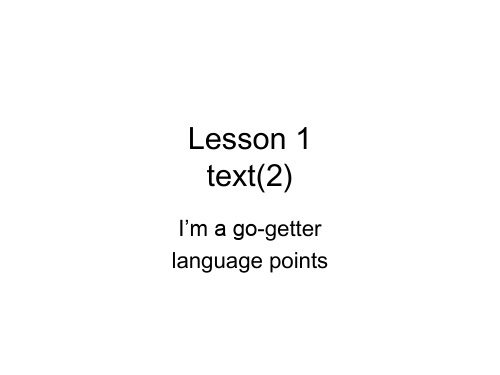
I’m a go-getter language points
Important words and expressions:
• 1.set out出发,打算,开始/着手做某事,阐述 • set about开始/着手做某事
• eg.The villagers set out __to__lo_o_k_(look) for the lost boy in the forest.
Important sentence patterns:
• 1.My aim is to do well in every subject this term.(不定式做表语)
• 常用不定式做表语的词有: aim,goal,wish,dream,duty,task,hope,idea等
• eg.Her wish is _to_b_e_c_o_m_e_(become) a singer. • My dream is _t_o_g_o__(go) to a key university. • =To go to a key university is my dream.
• (relax). • The good news made us _e_x_c_it_e_d_(excite). • He made the workers __w_o_r_k__(work) ten
hours a day. • His coming home late made his father_w__o_rr_ie_d_
• (worry).
• 9.I often use pictures _t_o_a_t_tr_a_c_t _(attract) people’s attention.
Unit 1 (1)
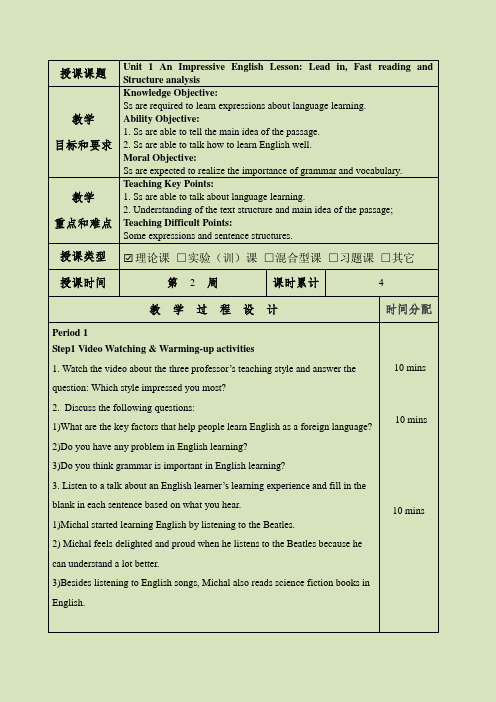
授课课题Unit 1 An Impressive English Lesson: Lead in, Fast reading and Structure analysis教学目标和要求Knowledge Objective:Ss are required to learn expressions about language learning.Ability Objective:1. Ss are able to tell the main idea of the passage.2. Ss are able to talk how to learn English well.Moral Objective:Ss are expected to realize the importance of grammar and vocabulary.教学重点和难点Teaching Key Points:1. Ss are able to talk about language learning.2. Understanding of the text structure and main idea of the passage; Teaching Difficult Points:Some expressions and sentence structures.授课类型☑理论课□实验(训)课□混合型课□习题课□其它授课时间第2周课时累计 4教学过程设计时间分配Period 1Step1 Video Watching & Warming-up activities1.Watch the video about the three professor’s teaching style and answer the question: Which style impressed you most?2.Discuss the following questions:1)What are the key factors that help people learn English as a foreign language?2)Do you have any problem in English learning?3)Do you think grammar is important in English learning?3. Listen to a talk about an English learner’s learning experience and fill in the blank in each sentence based on what you hear.1)Michal started learning English by listening to the Beatles.2) Michal feels delighted and proud when he listens to the Beatles because he can understand a lot better.3)Besides listening to English songs, Michal also reads science fiction books in English. 10 mins 10 mins 10 mins4)Michal made a great breakthrough in learning the English language after successfully finishing reading the first English book.5) According to Michal, English learning brings him satisfaction and pleasure.3.Listen to the talk again and discuss the questions.1)How does Michal learn English?2)In your opinion, what is the most effective way to learn English?Step 2 Understanding the text1.Ask students to do fast reading and try to answer the questions in Exercise 1on page 9.2.Ask students to discuss the questions in groups.Period 23. Check students’ fast reading:1) Why does the son think that his father is a tedious oddity?Because he is tired of listening to his father and he is not interested in grammar rules.2)How do you understand the sentence”The civilization of Greece and the glory of Roman architecture were captured in a condensed non-statement”(Para.4)?The civilization of Greece and the glory of Roman architecture are so marvelous and remarkable that they should be described at least in a brief account; however, what the student could do was only one single utterance:”Whoa!”without any specific comment.3) Why does the author think that students’ language deficits should be blamed on schools?Because the schools fail to set high standards of language proficiency. They only teach a little grammar and less advanced vocabulary. And the younger teachers themselves have little knowledge of the vital structures of language. 4) Why does the author say that the work of teaching grammar must be handled 15 mins 15 minsdelicately?Because teaching grammar is not an easy job and most of the students will easily get bored if it’s not properly dealt with.5) What does the father teach the son while giving him a grammar lesson?He familiarized his son with different parts of speech in a sentence and discussed their specific grammatical functions including how to use adverbs to describe verbs.6) Why does the son feel curious about what his father said?Because the son had never heard about the various names and functions of words in an English sentence before.7) What are the two things that the author uses to describe grammar and vocabulary?The author uses “road map”and “car”to describe grammar and vocabulary. Here, “road map”is considered as grammar and “car”as vocabulary. 8)How do you understand the interjection “whoa!’said by the father toward the end of the text?Since the subjunctive mood his sun used is an advanced grammar structure, the interjection “whoa!”reflects the tremendous pride the father and toward his son; it also reflects the author’s humor in using the word because it was once used by his students, though in two different situations and with two different feelings.4.Main ideas of the partsThis passage is a narrative that talks about the author’s personal experience in giving an effective English lesson to his son. He states that students can learn better if they are properly taught.Part I (Paras. 1- 5)The background of the storyThe author is absorbed in grammar;The author was shocked by his student’s inability to describe properly her trip to Europe;Students should not be blamed for these knowledge deficits.Part II (Paras. 6-13) BodyExplains why students shouldn’t be blamed for their language deficiency by providing two reasons and one example. 10 mins 15 mins教学过程设计时间分配Elaborates the importance of grammar and vocabulary in learning English.Part III (Paras. 14-17)Narrates another incident where his son unconsciously uttered a grammaticallyperfect sentence with a subjunctive mood, which made the author so proud of hisson.Step 3 SummaryAn Impressive English Lesson5 mins This passage is a narrative that talks about the author’s personal experience ingiving an effective English lesson to his son. He states that students can learnbetter if they are properly taught.To my son, I am a tedious oddity: a father he is obliged to listen to and a manabsorbed in the rules of grammar. And I got serious about this because my studentwas unable to describe properly her feeling on her excursion to Europe.作业布置1. Preview the new words on P5-8.2.Task 3 on page 9.教学小结。
【全国百强校】河南省郑州市第一中学人教版高中英语必修一课件:unit1 Language points(共53张PPT)

二、短语翻译
1.__ad_d__u_p______合计 2.__ca_l_m__d_o_w_n___ (使)平静;(使)镇定 3.__su_f_fe_r_f_r_o_m___ 遭受;患病 4.__jo_i_n_i_n______ 参加(活动) 5.__g_o_t_h_ro_u_g_h___ 经历;经受
11. _g_r_a_t_e_f_u_l__ adj.感激的 12. _o_u_t_d_o__o_r_s_ adv.在户外 13. _h_i_g_h_w__a_y__ n.公路;大路 14. _s_u_i_t_c_a_s_e__ n.手提箱;衣箱 15. _o_v_e_r_c_o__a_t_ n.大衣;外套
⑴ 句中ignore是及物动词,意为“忽 视,不顾,不理睬”。
⑵ 句中calm是及物动词,意为“使平静, 镇静”; 此外,还可作形容词,表示 “冷静的,平静的”。常用搭配有:
calm down平静下来,镇静下来 calm...down使平静/镇静下来 keep/stay calm 保持冷静
运用 根据中文提示完成下列句子。
⑵ The teacher is not good at teaching. No wonder the children grow bored _w__it_h_ his lesson.
go through 经历(困难,痛苦);检查 get through通过;接通电话
运用 根据中文提示完成下列句子。
⑴ One can be strong, brave and faithful after all these hardships he _h_a_s_g_o_n_e_t_h_r_ou_g_h__ (经所经历的).
3.Or are you afraid that your friend would laugh at you, or would not understand what you are going through . 或者你害怕 你的朋友嘲笑你,或者害怕你朋友不明白 你正在经历什么?(B1 P2)
高中英语必修一 Unit1 强调句型
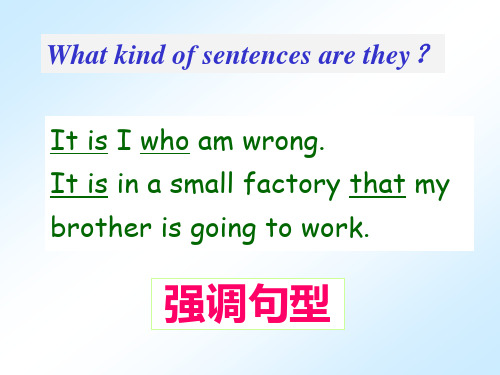
3). 强调句型的注意点
It is your father who is wrong this time. It is his parents who have come to China.
主语 一致 谓语
① 主谓一致:被强调部分作主语时, 其形式与谓语动词在人称和数上保持 一致。
It is Mary who often h_e_l_p_s (help/helps) me with my English.
much pain. • You have no s for the _______
(suffer) of others.
3. recover v. 痊愈,恢复; 重新获得
4. get tired of... 对……厌倦的 be tired of...
be tired from... 因……疲倦的
2. Now that the plan has been made, let's settle down to carry it out.
suffer & suffer from
2. suffer vt 遭受,忍受,+抽象名词loss, pain, punishment, hardship, etc.
单句改错
• 1. It was along the Mississippi River where Mark Twain spent much of his childhood.
• 2. It was her advice which made me a better speaker and full of confidence.
解决(问题、争端等)
settle a problem/ the matter settle down to (doing) sth 开始认真做某 事 ______n. 定居者,殖民者 __________n. 协议,解决
一年级英语上册教案unit 1 lesson 1-清华版
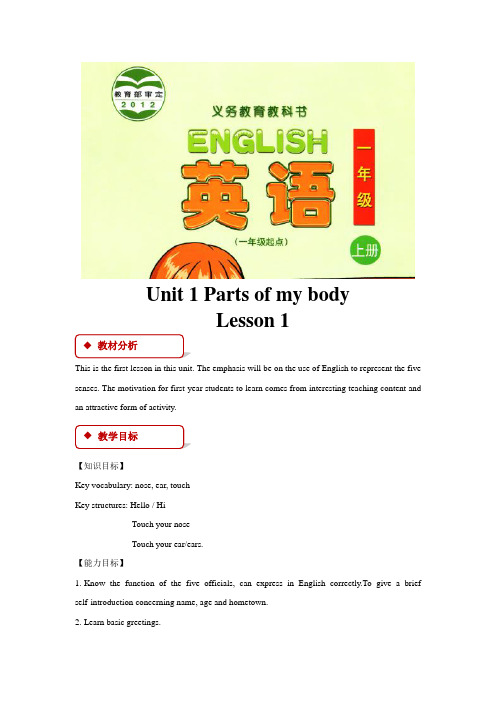
Unit 1 Parts of my bodyLesson 1This is the first lesson in this unit. The emphasis will be on the use of English to represent the five senses. The motivation for first-year students to learn comes from interesting teaching content and an attractive form of activity.【知识目标】Key vocabulary: nose, ear, touchKey structures: Hello / HiTouch your noseTouch your ear/ears.【能力目标】1.Know the function of the five officials, can express in English correctly.To give a brief self-introduction concerning name, age and hometown.2.Learn basic greetings.【情感目标】To motivate the students and greet them in English.【教学重点】1. Understand, speak, and recognize the two words in your body: nose, ear.2. Understand the plural form of a noun.【教学难点】The plural meaning and form of a noun are not easy to understand.Tape recorder, MultimediaStep 1. Warm-upTeachers stand on the platform to create real communication situations.Kindly say hello to the students. Walk up to the students and lead the students to say hello. Step 2. Listen, look, and says1. Show the students nose, ear, ears, according to the recording and pictures.2. The teacher refers to his five officials, and the students speak English.Step 3. Do it1.Through the instruction of the teacher. Use imperative sentences: touch your nose.2. Let the students learn to do.3. Learning to touchStep 4. Listen and checkPut an audio clip, and let the students do the selection.Step 5. Listen to doRead music, lead the students to sing, and start pointing out the appropriate parts.Step 6. Language pointsnoseearearstouch your nose略。
新编英语教程1unit1
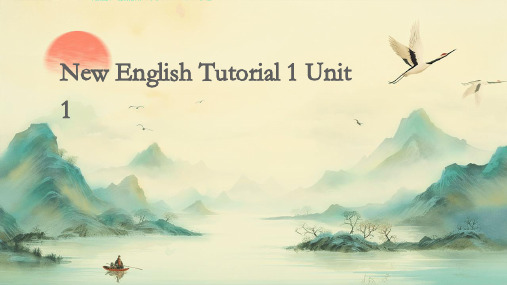
04
提前阅读问题,了解需要回答 的内容和要求。
在听的过程中,注意捕捉关键 信息和细节,记录重要内容。
根据问题类型,选择合适的答 题方法,确保答案准确、完整
。
Listening skills sharing
预测答案
根据问题和听力材料的主题,预测可能的答案。
筛选无关信息
在听的过程中,快速筛选出与问题相关的信息,忽略无关内容。
04
reading comprehension
Reading article analysis
文章主题分析
文章结构分析
文章语言特点分析
文章逻辑关系分析
本篇文章主要探讨了英语学习 的技巧和方法,包括词汇、语 法、阅读和写作等方面的学习 建议。
文章采用了总分总的结构,先 总体介绍了英语学习的重要性 ,然后分别从词汇、语法、阅 读和写作四个方面进行了详细 阐述,最后总结了提高英语学 习的关键因素。
Analysis of Listening Materials
词汇量
评估听力材料中涉及的词 汇量,确定是否超出了学 生的词汇范围。
冀教版九年级英语unit 1教案
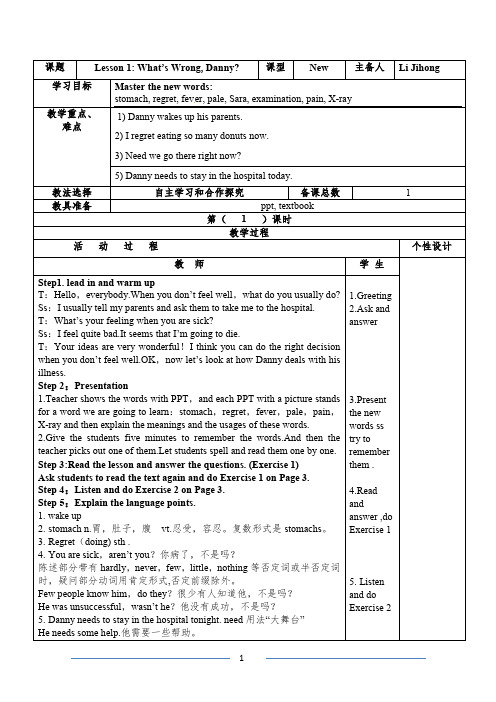
课题Lesson 1: What’s Wrong, Danny?课型New 主备人Li Jihong学习目标Master the new words:stomach, regret, fever, pale, Sara, examination, pain, X-ray教学重点、难点 1) Danny wakes up his parents.2) I regret eating so many donuts now.3) Need we go there right now?5) Danny needs to stay in the hospital today.教法选择自主学习和合作探究备课总数 1教具准备ppt, textbook第( 1 )课时教学过程活动过程个性设计教师学生Step1. lead in and warm upT:Hello,everybody.When you don’t feel well,what do you usually do? Ss:I usually tell my parents and ask them to take me to the hospital.T:What’s your feeling when you are sick?Ss:I feel quite bad.It seems that I’m going to die.T:Your ideas are very wonderful!I think you can do the right decision when you don’t feel well.OK,now let’s lo ok at how Danny deals with his illness.Step 2:Presentation1.Teacher shows the words with PPT,and each PPT with a picture stands for a word we are going to learn:stomach,regret,fever,pale,pain,X-ray and then explain the meanings and the usages of these words.2.Give the students five minutes to remember the words.And then the teacher picks out one of them.Let students spell and read them one by one. Step 3:Read the lesson and answer the questions. (Exercise 1)Ask students to read the text again and do Exercise 1 on Page 3.Step 4:Listen and do Exercise 2 on Page 3.Step 5:Explain the language points.1. wake up2.stomach n.胃,肚子,腹vt.忍受,容忍。
九年级英语上册Unit1教案

Unit 1 Stay Healthy Lesson 1: What’s Wrong, Danny?stomach, regret, fever, pale, Sara, examination, pain, X-rayII. Learning important and difficult points:1) Danny wakes up his parents.2) I regret eating so many donuts now.3) Need we go there right now?4) She takes them to a small examination room.5) Danny needs to stay in the hospital today.Language Points:1. regret【用法】作及物动词,意为“对……感到后悔”,后加名词、代词、动名词作宾语。
【举例】①Tony has been regretting that matter. 托尼对那件事情一直感到很后悔。
②I regret making such a foolish decision. 我后悔做出这么愚蠢的决定。
【用法】作不可数名词,意为“遗憾、惋惜”。
【举例】His great regret is not seeing his father for the last time. 他最大的遗憾是没有能最后一次见他父亲一面。
2. Danny wakes up his parents. 丹尼把他的父母叫醒了。
【用法】短语wake up意为“叫醒”,这是“动词+副词”短语。
这类短语用名词作宾语时,名词可在副词前,也可用在副词后;如用代词作宾语时,代词则必须用在副词前。
故这句话中的wake up his parents 还可说为wake his parents up。
【举例】Mum, will you please wake me up at five tomorrow morning? 妈妈,你能在明天早晨五点钟叫醒我吗?【拓展】wake up也可不带宾语,意为“醒来”。
2014年北师大英语必修一lesson1 language points课件
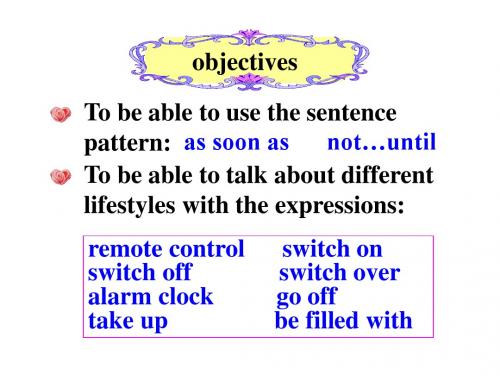
6. remote
adj. 偏僻的, 遥远的, 远程的
Байду номын сангаас
这颗炸弹是遥控 引爆的。 The bomb was exploded by remote control . 公共汽车每周只到这个偏僻的村庄一次。 Bus comes to this remote village only once a week.
7. As soon as I hear my alarm clock , I jump out
of my bed. as soon as 一……就…….
从句通常用一般现在时表将来
I’ll write to you as soon as I get there.
我一到那就 给你来信。
8. take up 1) 占据(时间、空间) 这个桌子太占地方。 This table takes up too much room. 她的时间都用来 写作了。 Her time is fully taken up with writing. 2) 拿起,举起(物)
not…until 直到某时动作才发生 他昨晚十二点才睡觉。 He didn’t go to sleep until 12 last night.
2. switch on = turn on 接通, 打开(电器)
让我们打开录音机, 欣赏一会儿音乐吧。
Let's switch on the tape-recorder and enjoy music for a while.
她拿起 她的手提包 走了。 She took up her Boston bag and left.
3) 开始(工作,产生兴趣等,尤其指做以 前未做过的事,或作为消遣的方式) 当他在西班牙的时候,他开始学习西班牙语。 He took up Spanish while in Spain. 4)继续(中断的活),接下去
新外研版八年级上册英语 Module 1 Unit1 教学课件

第十四页,共二十六页。
新课讲解
Language points 1
Work in pairs.
Point pair/peə/ n.(相关的)两个人,一对
(1)a pair of 表示“一双/副”,后常接表示成双成对的复数名词。 eg:Let’s act out the dialogue in pairs.
新外研版八年级上册英语 Module 1 Unit1 教学课件
科 目:英语 适用版本:新外研版 适用范围:【教师教学】
Module1 How to learn English?
Unit 1 Let’s try to speak English as
much as possible
第一页,共二十六页。
第七页,共二十六页。
新课讲解
3 Listen and read
Ms James:Welcome back ,everyone!Today,we're going to talk about good ways to learn English.Ready?Who has some advice?❻ Lingling:We should always speak English in class. ❼ Ms James:Good!Let’s try to speak English as much as possible. ❽ Daming:Why not write down our mistakes in our notebooks?❾ Ms James:That‘s a good idea.And don’t forget to write
新人教版八年级英语下册Unit1(1)教案

新人教版八年级英语下册Unit1(1)教案In this lesson。
we will be learning about health problems and how to give advice。
Our language goals are to learn vocabulary related to health problems and how to give advice based on someone's health issues。
Our skill goals are to be able to understand dialogues about health problems。
give advice based on someone's health issues。
and write key words and sentences related to health problems。
Our values goal is to cultivate students' empathy towards others' health and to promote a spirit of mutual help during emergencies.We will be focusing on phrases such as "have a stomachache," "have a cold," "lie down," "take one's temperature," "go to a doctor," "get off," "to one's surprise," "agree to do sth," "get into trouble," "fall down," "be used to," "run out (of)," "cut off," "get out of," "be in control of," "keep on (doing sth.)," and "give up." We will also be practicing sentences such as "What's the matter?" and "I have a stomachache。
新牛津上海版深圳英语二年级上册unit 1《good morning》教学设计1(精品).doc
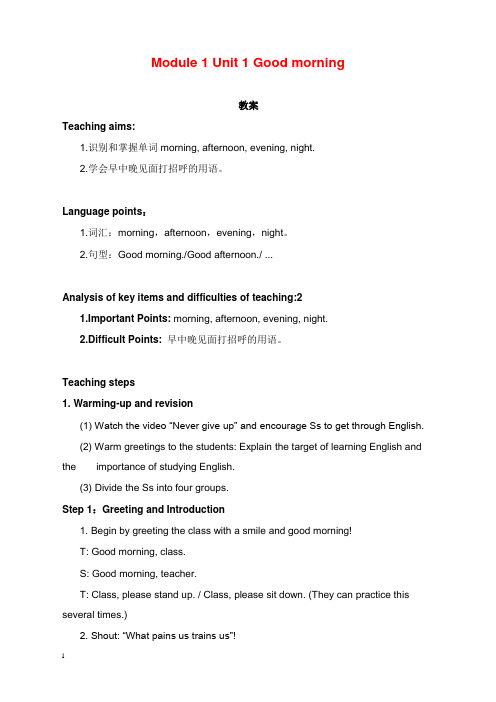
Module 1 Unit 1 Good morning教案Teaching aims:1.识别和掌握单词morning, afternoon, evening, night.2.学会早中晚见面打招呼的用语。
Language points:1.词汇:morning,afternoon,evening,night。
2.句型:Good morning./Good afternoon./ ...Analysis of key items and difficulties of teaching:21.Important Points: morning, afternoon, evening, night.2.Difficult Points:早中晚见面打招呼的用语。
Teaching steps1. Warming-up and revision(1) Watch the video “Never give up” and encourage Ss to get through English.(2) Warm greetings to the students: Explain the target of learning English and the importance of studying English.(3) Divide the Ss into four groups.Step 1:Greeting and Introduction1. Begin by greeting the class with a smile and good morning!T: Good morning, class.S: Good morning, teacher.T: Class, please stand up. / Class, please sit down. (They can practice this several times.)2. Shout: “What pains us trains us”!3. Point to myself and say I’m Miss…Have them repeatRepeat this a few times with rows and individuals or try a “back-chain”.Drill:Miss/Mr… (Ss repeat)Morning, Miss/Mr… (Ss repeat)Good morning, Miss / Mr… (Ss repeat)Step 2: PracticeSay: Stand up, please! (Ss stand up) (Leave the classroom, return)T: Good morning, class!S: Good morning, Miss / Mr…T: Sit down, plea se. Now let’s start the lesson.Step3:Play a game.Each two students in a group to pracitse the dialogues:2“Good morning, Ling Ming!”“Good morning, Zhang Hong!”“Good afternoon, Mr. Zhao!”“Good afternoon!”“Good evening!”“Good evening!”“Good night,Dad!”“Good night!”Step4. Presentation.Show a picture with Eric, let Ss guess what Eric wants to say to usThe answer is “Hello!” or “Good morning.” Then help them to say: “Hello, Eric!” or “Good morning, Eric.”Homework:Please say “Good morning/afternoon/evening/night.” to your parents.。
lesson1

Do you ever watch too much TV? How much time do you spend watching TV every day? Point out what kinds of TV programme they are. music programmes
What does a couch potato refer to? A couch potato is someone who
watches lots (some would say too
much! ) of television. “沙发马铃薯”。它不是马铃薯的 变种, 而是现代社会里的产物, 指浪 费太多时间看电视的人。
2. What do you think “You’ve got the world at your feet” means? It means that you are able to know what is going on around the world through the TV. With the control,
get home late; bring back;
have no time with family; complain about
You work too hard! You may need more time to enjoy your life with your family.
Consolidation-Listening
冀教九上Unit1 Lesson1What’swrongDanny课件
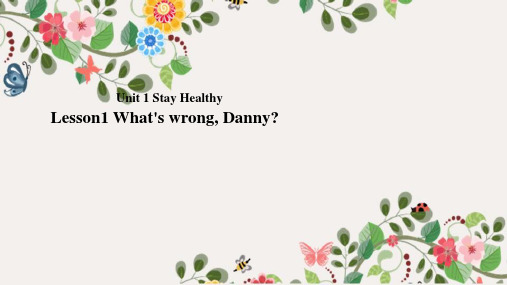
4.Though it's very late in the night, the hospital is still opeTn.(
)
F
5.A doctor talked to Mr Dinosaur and tFook them to a room.(
)
6.Mrs Dinosaur will stay with Danny .〔 〕
They arrived at a decision after much thought at last. 最后他们经过反复考虑后做出了决定。
Attention: arrive in后一般接表示大地方的名词;arrive at后一般接 表示小地方的名词。 reach, get to与arrive at/in的区别 三者都有“到达〞之意。所不同的事,reach是及物动词, 后面可直接接表示地点的名词。get加上to,即get to才是“ 到达〞的意思。arrive为不及物动词,要加上介词at/in才 能接表示地点的名词。 --When did you reach /get to/arrive in Hangzhou? 你是什 么时候到杭州的? --I reached /got to /arrived in Hangzhou yesterday evening. 我是昨天晚上到的杭州。 When she reached /got to/arrived at the shop, she found the shop was closed. 当他到达商店时,他发现门关了。
情况正在好转! b.寻访到,探访〔某人〕 On my way home, I looked up an old friend of mine. 在回家 的路上,我去看望了一下我的老朋友。
人教版九年级英语第一学期教案(全册)
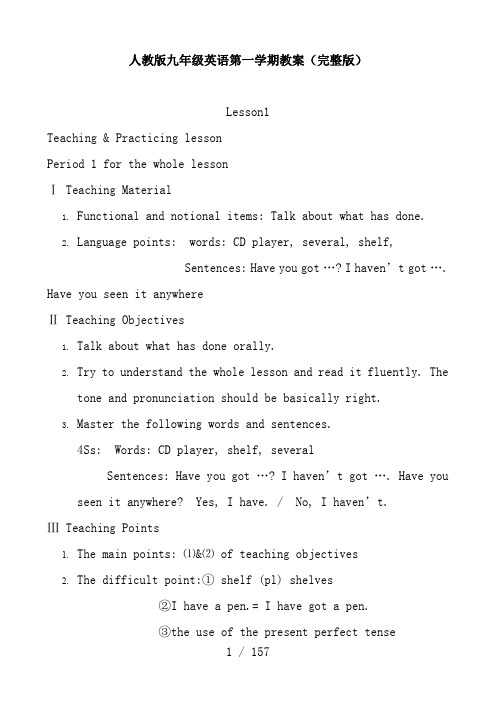
人教版九年级英语第一学期教案(完整版)Lesson1Teaching & Practicing lessonPeriod 1 for the whole lessonⅠ Teaching Material1.Functional and notional items: Talk about what has done.nguage points: words: CD player, several, shelf,Sentences: Have you got …? I haven’t got …. Have you seen it anywhereⅡ Teaching Objectives1.Talk about what has done orally.2.Try to understand the whole lesson and read it fluently. Thetone and pronunciation should be basically right.3.Master the following words and sentences.4Ss: Words: CD player, shelf, severalSentences: Have you got …? I haven’t got …. Have you seen it anywhere? Yes, I have. / No, I haven’t.Ⅲ Teaching Points1.The main points: ⑴&⑵ of teaching objectives2.The difficult point:① shelf (pl) shelves②I have a pen.= I have got a pen.③the use of the present perfect tenseⅣ Teaching Procedureanization of the classA.GreetingB.Raise requirementT: We’re going to talk about the library.2.ReviewA.OralT: Do we have a library in our school? What do we have in the library? What can we do in the library?3.The teaching of the new lessonLesson 1T: Let’s learn Unit 1 In the library, Lesson 1. (write down the title)Teach: Have you got …?T: If you want to borrow a history book from the library, what do you say?Ss: Excuse me, do you have a history book?T: Yes, and we can also say: Have you got a history book?Write down the new sentence and compare the new one and the old one. Then teach the negative form and simple question form.And make more examples.Examples: He has got a good pen.They haven’t got any water.Our school has got a lot of students.B、Teach: Part 1T: Have you got a ruler? S1: Yes, I have. Here you are.T: Have you got an umbrella? S2: Sorry, I haven’t. Ask …Ask the Ss to use Part 1 to make new dialogue in pairs and then ask some to do it in front of the class. Teach “ CD player” at the same time.B.Teach: severalT: Have you got a pen? How many pens have you got?S1: FiveT: We may also say: “You’ve got several pens.”Write down the word: severalB.Teach: shelfT: Just now we talked about the library, we know there are many books in the library. Where are the books put?Teach: on the shelf shelf (pl) shelvesB.Part2T: Now I’d like you to make a dialogue talking about borrow ing books about different subjects.Do it in pairs first then ask some to do it.Analysis: books about … at the moment = now = right now B.Part 3Dialogue 1Listen and answer: Well, when you borrow books from the library, you must be careful, but Jim is not careful.What happened? Where was the book?Then read it and learn the dialogue.Analysis: Have you seen it anywhere? ( tense and the use of anywhere) Dialogue 2Listen and answer: How about Tom? What has he lost? Where was it?Read and learn.Analysis: have lost (tense)Perhaps he’s seen it. ( ‘s is short for has)I saw it on Lin Tao’s desk five minutes ago. ( tense)B. Conclusion1. have got = have 2 several = a few 3.on the shelf4. the present perfect tenseA.Wb. Ex1 &24.Homework1.Do Wb. Ex 3&42.Recite Part 3Lesson 2Reading lesson2 periods for Lesson 2ⅠTeaching Materialsnguage points:Words: already, yard, schoolyard, step, librarian, probably, pay, sadly, mark, bookmarkPhrases: used to, put down, pay for, come up withSentences: Her hobby is reading.So was the librarian.Now her lost books are usually returned to the library.ⅡTeaching Objectives1.Read the whole lesson and try to understand its content. Makesure to answer the questions in Wb correctly.2.Read the lesson fluently, the pronunciation and tone should beright.Ⅲ Teaching Points1.The main points---(1)&(2) in teaching objectives2.The difficult pointsA: already, “al” makes an / / soundB: the difference between “on” and “about”C: make sb. + adj.D: used to do sth.E: come up with an idea= think of an ideaPeriod 1Ⅳ Teaching Procedureanization of the classT: Today we are going to Lesson 2, in Lesson 2, we are going to talk about the library.2.ReviewT: Before we learn the new lesson, let’s go over what we learned yesterday.A.OrallyHave = have got eg. They don’t have any shelves.= They haven’t got any shelves.Has = has got eg. Does he have a CD player?= Has he got a CD player?Several=a fewOn the shelfThe construction and concept of the present perfect tenseB.Recite Part 2C.Wb. Ex33.The teaching of the new lessonA.Lesson 2T: We know we can borrow books from a library. But if we lose the books, what should we do? Let’s go on to learn Lesson 2, we will know the answer in it.( write down Lesson 2) B.pay forWell, you should pay for it.Teach: pay, paid, paidPay for : give money to sb. for sth.C.onT: Why do people like to go to the library?T: Because there are books on many different subjects. D.knowledgePeople can learn much knowledge from them.E.Part 1 Pre-readF.Part 2Ask the Ss the read the passage and answer questions in their Wb. Ex 1G.Read and learnParagraph 1T: How old is the writer’s grandma?What was she?What is her hobby?Why does she love books?4.Homework.A. Read the end of the text and finish the exercises in Wb.Junior English for ChinaBook 3Lesson 3课型:讲练课ⅠTeaching Materials1.Functional and notional itemsAsk questions about something has donenguage MaterialsWords: encourage, once, abroad, copyPhrases: think of, encourage sb. to do sth., get sth. back, pick upSentences: Have you ever been abroad? Yes, just once.I’ve just cleaned the kitchen.Really? I did that hours ago.Grammar: The difference between the present perfect tense and the past indefinite tenseⅡTeaching Objectives1.Learn to ask questions about something has done2.Read the whole lesson fluently, and pronunciation and intonationshould be right.3.Master the following materials(4 skills) Words: once, copyPhrases: think of, pick upSentences: Have you been abroad? Yes, only once.(3 skills) Words: encourage, abroadPhrases: get sth. back, be abroadⅢ Teaching Points1.The main points: (1)&(2) in teaching objectives2.The difficult points:A.“ever, just, already”, they should be put in the middleof “ have done”B. The difference between the present perfect tense and thepast indefinite tenseⅣ Teaching Procedureanization of the class2.RevisionBefore we go on to learn the new lesson, let’s go over what we learn in Lesson 2.A.OralGrandma lost library books. If she really lose them, what should she do?Did the librarian have any ideas? What is it?What did they doB. Workbook Ex23.The teaching of the new lessonA.Lesson 3Can Grandma get all her lost books back? Let’s go on to learnLesson 3.B.Read Part 1 and answer the following questions:Did Grandma get all her lost books back?How did she get them back?C.Read and learn*Think of:认为、想起、想出Eg: What do you think of it?I often think of my friends in Beijing.*Encourage sb. to do sth.Eg. The teacher thought a lot about how to encourage his students to study hard.*Pick up: pick it\them up*return sth. to sb.*get sth. from sb.D.Reading practiceE.Retell the storyF.Ask and answerHave you ever picked up a library book? Yes, I have\ No,I haven’t.Ask the students to ask and answer in pairs by using Part2 and ask some to do it in class.Teach: abroad, onceDo Wb. Ex1G.Part 3Play and English songT: Have you ever listened to foreign music?Ss: Yes, we have.T: And we have just listened to it.Make sentences by using “ I have just…”Read and learnTeach: copyPoint out the difference between the present perfect tenseand the past indefinite tense.The present perfect tense s houldn’t be used together withthe past time.H.Conclusion●the use of “ever, just, already” in the present perfecttense●the difference between the present perfect tense and thepast indefinite tense4.HomeworkA.Wb. EX2&3B.Go over the language pointsLesson 4课型:练习课ⅠTeaching Materialsnguage MaterialsWords: spoil, as, screenPhrases: on the computer, find outSentences: I guess somebody else has borrowed it.Could you find out who has taken it?Grammar: The present perfect tenseⅡTeaching Objectives4.Read the whole lesson fluently, and pronunciation and intonationshould be right.5.Learn to read the information on the library cards and thecomputer screen.6.Master the following materials(4 skills) Word: asphrase: on the computer, find out(3 skills) Words: spoil, screenⅢ Teaching Points3.The main points: (1)&(2) in teaching objectives4.The difficult points: learn to read the information on thelibrary cards and the computer screenⅣ Teaching Procedureanization of the classToday, we are going to learn Lesson 4. In Lesson 4, we’re going to talk about the information on the library cards and thecomputer screen.6.RevisionBefore we go on to learn the new lesson, let’s go over what we learn in Lesson 3.A.OralHow could Grandma get all her lost books back?the use of the adverbs in the present perfect tense.7.The teaching of the new lessonA.Lesson 4Yesterday, we learned that grandma usually borrowed books from the library. There is a new library today. If you want to read books, how can you find them? Let’s go on to learn Lesson 4.B.Part1I’d like you to listen and do Wb. Ex.1C.Part 2Ask the students to write down something about the school librarian and report it to the class. Teach: as He works there as a shop assistant.D.Part 4Learn to read the information on the cards and the computer screen.E.Part 3Listen and answer: What does the boy want to borrow?What’s its name?Who has borrowed it?Read and learn.has borrowed, has taken, has got( the present perfect tense)find outRead and act.F.Part 5Read and learn.G.Checkpoint 1H.Wb. Ex.2&58.HomeworkA.Wb. Ex 3B.Go over the whole unit.Lesson 5课型:讲练课ⅠTeaching Materials4.Functional and notional itemsA. Learn to ask how long sb. has done sth.B. Learn to talk about if someone has been to a place.nguage MaterialsWords: surf, surfing, surfer, wave, Hawaii, beach, twice, Bondi, none, Newquay, water-ski, canoePhrases: have a try, since last Wednesday, learn sth. from sb.how to do it, several timesSentences: What’s …like?How long have you been in Sydney?Have you ever been to …?Grammar: the present perfect tenseⅡTeaching Objectives7.Learn to ask questions about something has done8.Read the whole lesson fluently, and pronunciation and intonationshould be right.9.Master the following materials(4 skills) Words: surf, surfing, surfer, wave, beach, twice,nonePhrases: have a trySentences: Have you been to…? Several times.(3 skills) Words: water-ski, canoe(1 skill) Words: Hawaii, Bondi, NewquayⅢ Teaching Points5.The main points: (1)&(2) in teaching objectives6.The difficult points:A.“ever, just, already”, they should be put in the middleof “ have done”B. The difference between the present perfect tense and thepast indefinite tenseⅣ Teaching Procedureanization of the classToday, we’re going to talk about water sports.2. RevisionRevise the names of the sports they have learnt: roller-skating, skating, jump, race, skiing.10.The teaching of the new lessonA.Lesson 5And swimming is a kind of water sport because you have to swim in the water.Well, what other water sports do you know? Let’s go on to learn Unit 2 Water sports.e colour page1 to teach: surf, surfing, surfer, wave,water-skiing, canoe.C.Part 1Listen and answer: Who can surf, Ted or Bruce?How long has Bruce been in Sydney?Why did he come to Sydney?Who teach Bruce to surf?Read and learn:What’s …like? = How is …?Since last WednesdayLearn sth. from sb.Have you ever been to …?Have a tryHow to do itD.Read and act.E.Part 2Have you ever surfed?Have you ever been to Hawaii?Ask and answer in pairsLearn: Bondi, Cape Town, Newquay, noneNo one 人单数 No one is herenone 人/物单数/复数 None of them is here.F.Wb. Ex3. 2 . 1 .G.ConclusionSurf, surfing, surfer, waveHe’s a surfer. Have a tryHow long have you been in …?Have you ever been to …?11.Homeworkwb. Ex 2P.S.The writing on the blackboardUnit 2 Water sportsLesson 5surf ①What’s …like? = How is …? Have a try surfing ②How long have you been in …? learn sth. from sb.surfer Since last Wednesday no one 人/ 单wave ③Have you ever been to …? none人/物单/复Hawaii ④None of us has. none of us (true)Cape Town No one has. no one of us (false)Lesson 6ⅠTeaching MaterialsWords: describe, especially, attract, so-called, possible, since, part-time, although, fit, prize, competition, event, Olympic, Waikiki, Honolulu, San FranciscoPhrases: all over, large numbers of, no matter, both…and…, give up, ever since, the Olympic GamesSentences: Now it is enjoyed by people all over the world.You can always find surfers out riding the waves.In the morning, he works as a part-time assistant in asurf shop.ⅡTeaching Objectives1.Try to understand the whole passage and read the whole lessonfluently and the pronunciation and intonation should be right.2.Master the following materials:4Ss Words: describe, especially, attract, so-called, possible, since, part-time, although, fit, prize,competition, event, OlympicPhrases: all over, large numbers of, no matter, both…and…, give up, ever since, the Olympic GamesSentences: Now it is enjoyed by people all over the world. You can always find surfers out riding the waves.In the morning, he works as a part-time assistant in a surf shop.3.Master the following materials:3Ss Words: Waikiki, Honolulu, San FranciscoⅢ Teaching Points1.The main points: (1) &(2) in teaching objectives2.The difficult points: A. the use of “although” B. the use of“no matter”C. the use of “ both…and…”Ⅳ Teaching ProcedurePeriod 1anization of the classTalk about surfing2.ReviewHave you ever been to Qingdao?Who has ever been to Bondi Beach? None of us.Has anybody water-skied before? Nobody has.3.The teaching of the new lessonA.Lesson 6In Lesson 5, we learned some water sports. Today, we are going to talk about one of them----surfing.B.Talk about surfingWhere is the best place for surfing? Why?Have you ever watched people surf?What do you think of it?Ask the students to say something about it.Teach: fit, prize, competitionSurfing will make you fit( healthy). Maybe you can take partin a surfing competition, then you may win a prize.Part 1 Pre-read Ask and answer then teach: watch sb. do sth.; describe sth.C.Part 2Read and do wb. Ex.1D.Conclusion.fit, win a prize4.HomeworkA.Go over what we learn todayB.Read the passage and find out all the new words, try to guesstheir meaning.Period 2Teaching Procedureanization of the classLearn the passage2.ReviewWatch sb. do sth.; fit(healthy); win a prize3.The teaching of the new lessonA. Paragraph 1Find out the key sentence. Then learn the new language points.one of…; be enjoyed by sb.; all over the world= everywhere in the world;be famous for\ as; especially; attract sb. to somewhere; large numbers of people(it is used to modify countable nouns)= a number ofRead this paragraph after the tape and then read it together.Ask some to read it in classB. Paragraph 2Find out the key sentence. Then learn the new language points..Read this paragraph after the tape and then read it together.Ask some to read it in classC.Paragraph 3Find out the key sentence. Then learn the new language points.D.Paragraph 4Find out the key sentence. Then learn the new language points.E.Conclusion4. HomeworkA.Wb. Ex. 2&3B.Retell the storyLesson 7课型:讲练课ⅠTeaching Materials1.Functional and notional itemsLearn to talk about something has donenguage materialsWords: such, fail, practice, New Zealand, businessPhrases: such great fun, on business, so farSentences: Time flies!He’s gone to New Zealand on business.ⅡTeaching Objectives1.Learn to talk about something has done.2.Try to understand the content and read the dialogue fluently,the pronunciation and intonation should be right.3.Master the following materials:4 skills Words: such, fail, practice, businessPhrases: so far, on businessSentences: He’s gone to …4.Master the following materials:2 skills Words: New ZealandⅢTeaching Points1.The main points: (1) & (2) in teaching objectives2.The difficult pointsA.such great funsuch+adj. +n.(不可数/复数)such a + adj. + n.(可数名词单数)与 so的区别B.have been surfingC.practice sth.\ doing sth.D.gone to & been togone to去了,强调不在说话地点been to 去过,强调对某地有所了解,可以在说话地点ⅣTeaching Procedureanization of the classWe are going to talk about Bruce and Ted again. In grammar, we are going to talk about the present perfect tense.2.RevisionA.Retell the story in Lesson 6.B.Wb. Ex2&33.The teaching of the new lessonA.Lesson 7In lesson 5, we know Bruce will show Ted how to surf. Can Tedsurf now?B.Listen and answerCan Ted surf? What has Bruce been doing every day? Why?When is Ted leaving for home?How about Bruce?Where is Bruce’s uncle?C.Read and learnTeach: *on Bondi Beach*such great fun: very funnysuch+adj. +n.(不可数/复数) such beautiful flowerssuch a + adj. + n.(可数名词单数) such a beautiful flowerso+ adj. So beautiful a flower如果在数量词“many, much, few, little”前,要用“so”eg: so much water, so many people* fail (in) the examfail to do sth.=can’t do sth.eg: fail the exam=not pass the examfail to catch the bus= miss the bus* need more practicepractice: 练习,实践(为不可数名词)如: Practice makes perfect.Practice : 练习(为及物动词)如:practice doing sth.* Time flies.* gone to去了,强调不在说话地点been to 去过,强调对某地有所了解,可以在说话地点eg: Where is he? He’s gone to his home.* on businessD.Reading Practice.E.Part 2 Ask and answeryet 用于否定句,一般疑问句及条件状语从句already用于肯定句,如果用于一般疑问句则表示惊讶的语气F.Answer the questions in groups. Teach: so far: up to nowAsk some to do it in classG.ConclusionH.Wb. Ex 14.HomeworkA.Recite Part 1B.Go over the whole lessonLesson 8课型:练习课ⅠTeaching MaterialsWords: cross, channel, mainland, slow, journey, among, proud, pride, unless, shot, truthPhrases: come true, slow down, be proud of, speak highly of, not only…but also…Sentences: Among them were his parents.He is not only the pride of our school, but also the pride of all the people in Hainan.ⅡTeaching Objectives1.Read the passage in Part 3 and try to understand its meaning.Read it fluently and the pronunciation and intonation should be right.2.Finish all the exercises in this lesson.3.Master the following materials as four skills:Words: cross, channel, mainland, slow, journey, among, proud, pride,Phrases: come true, slow down, be proud of, speak highly of, not only…but also…Sentences: Among them were his parents.He is not only the pride of our school, but also the pride of all thepeople in Hainan.4. Master the following materials as three skills: words: unless,shot, truthⅢTeaching Points1.The main points: (1) & (2) in teaching objectives2.The difficult points: not only…but also…如果连接两个主语时,用就近一致原则。
Unit 1 Lesson 1 公开课教学设计【八年级英语上册(冀教版)】

Unit 1 Me and my classLesson 1 Back to school教学设计本课的教学内容是冀教版八年级英语上册第一单元的第一课时, 学生的学习兴趣和积极性都比较高涨, 且学习的内容与实际联系紧密, 话题贴近学习生活。
重点引导学生如何与新同学和老师谈论自己的情况, 学会描述人物, 学会怎样提建议。
通过听说读写等方式, 完成本课教学任务。
【知识与能力目标】记忆单词physics 短语one … the other …, introduce …to …。
能用英语和班上同学进行自我介绍等交流。
【过程与方法目标】Reading and speaking【情感态度价值观目标】通过谈论新学期,了解中西文化的差异,能用英语表达中西方学校之间的差异。
【教学重点】掌握词汇physics, 接触词汇recent, 学习短语introduce …to …, one … the other …, make friends, the same as, one of …等。
【教学难点】重要句子: How was your first day of Grade 8? I was happy to see my classmates after such a long holiday. Well, you can introduce yourself to her.图片,PPT◆教材分析◆教学目标◆教学重难点 ◆ ◆课前准备◆◆教学过程Step Ⅰ. Lead inLeading in 【情景1】T: Hello, boys and girls! Welcome back to school! Listen to an English song. The name of the song is If You Are Happy. Now the new term starts. What new things do you have?[设计意图]新学期首节课用歌曲导入,英语歌曲能激发学生学习的动力,为学生提供更多、更好的训练听的机会, 最大程度地使学生回归到学校生活。
冀教版英语九年级全册Unit 1 Lesson 1 导学案

Unit 1 Stay HealthyLesson 1: What's wrong with Danny?【学习目标】知识目标1. 掌握的词汇:fever,stomach,examination, pale, regret,pain,pardon,X-ray2. 短语:wake (sb.) up;have (got) a fever;have (got) a pain;get dressed;be dressed in,point to; need to do sth.; need doing sth.; arrive at (in) = get to = reach 3. 句型:I don't feel well.Don't worry. The doctor will see you soon.It's going to be OK, son.能力目标:学会询问某人患了何种疾病及表达身体不适;学会谈论一些安康问题,并提出合理的建议。
情感目标:学会关心他人的安康。
【重点及难点】:1. What's wrong with you? = What's the matter with you? = What's your trouble?2. I regret eating so many donuts now.3. Danny’s father gets dressed quickly.4. Danny needs to stay in the hospital.5. We may need to take an X-ray.【导学过程】一、自主预习【预习指导】1.自学教材第1课单词与词组,你可以听录音跟读,根据音标读,或者请教别人读。
做到发音标准,弄清词性和汉语意思。
2.自学教材第2页内容,仔细读课文至少三遍,弄清课文大意。
用红色横线划出文中的重要句子。
新标准大英第一册Unit 1-Unit 5综合教程教案
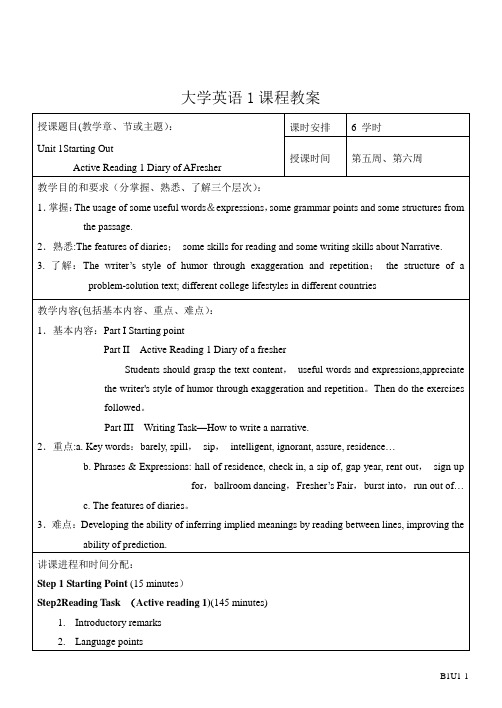
大学英语1课程教案Unit 1 Starting OutTeaching Content:Diary of AFresherLesson Type: Intensive Reading (New StandardCollege English Book 1)Total Time:4。
5 HoursClass/Object:Freshman (the first term)Teaching Procedures:Step 1Starting Point(15mins)1. What do you expect to learn in the university?2。
Work in pairs。
Look at the photo of a university. Choose words to describe it。
And then think of words to describe your own college.3. Work in pairs。
Brainstorm college education objectives and what are important to you.☐finding a girlfriend / boyfriend☐studying hard and learning a lot☐meeting people and making friends☐getting a good job when you graduate☐having fun☐growing up and becoming independent☐going to parties☐doing lots of sport☐reading widely☐learning new skills and having new experiencesStep 2Introductory remarks(10mins)How to write a diary in English1. Format:a. Write down the date, the day and the weather on the first line. The date and the day areon the left,while the weather is on the right.b。
第三版新视野大学英语1-unit1教案
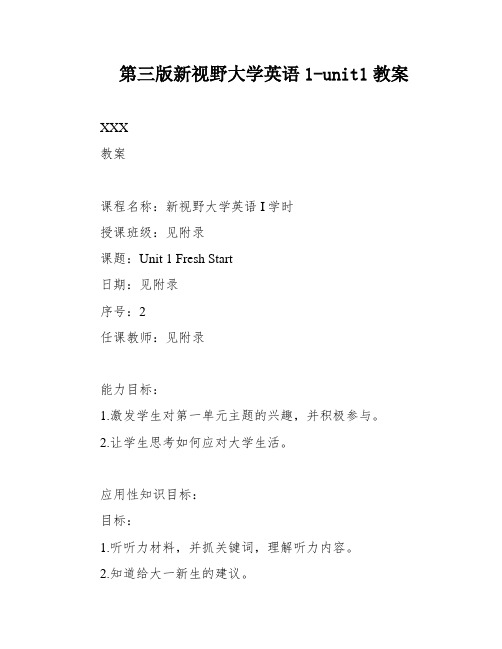
第三版新视野大学英语1-unit1教案XXX教案课程名称:新视野大学英语I学时授课班级:见附录课题:Unit 1 Fresh Start日期:见附录序号:2任课教师:见附录能力目标:1.激发学生对第一单元主题的兴趣,并积极参与。
2.让学生思考如何应对大学生活。
应用性知识目标:目标:1.听听力材料,并抓关键词,理解听力内容。
2.知道给大一新生的建议。
3.正确的发音朗读单词和短语。
教学训练项目(任务):1.听力技巧训练:抓关键词,理解听力内容。
2.新生建议听力活动。
3.词汇训练。
教学媒体准备:1.新视野大学英语I光盘。
2.新视野大学英语I unit1课件。
教学活动步骤及时间安排:1.问候和介绍(10分钟)2.说课(30分钟)3.主题讲解:大学新生的新起点(10分钟)4.听力活动:听一篇采访(20分钟)5.词汇训练(30分钟)板书设计:听力XXX:1.Keep a balance2.Go to class regularly3.Participate in Campus ActivitiesGetting XXX is a great way to make new XXXJoining clubs。
attending events。
XXX。
By doing so。
you can attain a sense of XXX.4.Find a XXXFinding a good place to study is crucial for academic success。
Whether it's the library。
a quiet coffee shop。
or a study room in your dorm。
it's important to have a designated space where you XXX studying。
you can XXX.5.Utilize Campus Study ResourcesXXX of study resources to help students succeed。
- 1、下载文档前请自行甄别文档内容的完整性,平台不提供额外的编辑、内容补充、找答案等附加服务。
- 2、"仅部分预览"的文档,不可在线预览部分如存在完整性等问题,可反馈申请退款(可完整预览的文档不适用该条件!)。
- 3、如文档侵犯您的权益,请联系客服反馈,我们会尽快为您处理(人工客服工作时间:9:00-18:30)。
Unit 1 Lesson 1 Language Points备课人审核人I. Translation1.把开关打开___________2.关上__________3.转换频道____________4.此刻______________5.进行锻炼________6.铃声)响____________7.穿衣服_______________ 8.占据___________ 9.从…跳下来____________10.至始至终干某事__________11.吃早餐__________12.上车____________13.第一个做某事____________14.充满装满________15.紧急事件_____________16.做好准备________________17.回复信件________18.娱乐________________19.赚钱_________________ 20.抱怨_____________II key phrases1. switch on/over/offI often _________ the TV and watch MTV. But my brother always ________ to watch the football game. Last night, I didn’t agree with him, so I _________ and went to sleep. But my brother ______ it______ again!2. relaxing / relaxedI spent a _________ afternoon in the garden.A student’s life in our school is peaceful and ________.Lying in the sun Lucy looks ________and happy.3.go off (Match work)The thieves ran away when the burglar alarm went off. 电力中断,电灯熄灭Hamlet goes off stage left . 发出声音,发出巨响The gun went off by accident. 变坏变质Suddenly, the lights went off. 退场,下场This milk has gone off. 开火,爆炸4take upThis table takes up too much room.Her time is fully taken up with writing. ( )A fewer years later I dropped medicine and took up physics. ( )He said he would take up my difficulties with the headmaster. ( )When can you take up your learning?( )I'll take up the story where you left off. ( )He called on the people to take up arms to defend their freedom. ( )5be filled with / be full ofHer eyes are filled with tears.------- Her eyes ______________tears.______ ___(充满)smoking people, the room ____ _______ ____(充满了)smoke.plain to sb about sth 向某人抱怨某事,投诉某事complain of 诉说(有什么的病痛)complain that 抱怨、投诉Dan has been complaining _____ headaches .Recently he complained ____ the police ____ the dogs barking. He complains that he doesn’t get enough sleep because of the noise. III.Sentence patterns1. What kind of lifestyles do you think the men in the pictures have?该句为混合疑问句,基本结构为:疑问词+ 插入语+ 陈述语序常见的插入语有:do you believe, do you suggest, do you suppose,翻译下面句子:你知道她住在哪个屋子?_______________________________________________.你猜他们什么时候放假?_______________________________________________.你建议我向谁求助?___________________________________________________.t live this lifestyle without a good wife.翻译下面句子:不努力学习,你就没法通过考试。
_________________________________________.没有电,今天的人类生活将大不相同。
______________________________________ 没有你的帮助,我不可能取得这么大地进步。
________________________________ 3. It takes me less than fifteen minutes to wash, get changed, have breakfast, leave home and get on a bus.(花费某人多长时间做某事)翻译下面句子:他花了半个小时才做出那道数学题。
___________________________________________2) get changed ----be / get +done “有两种含义,一是表示被动,二是表示某件事意想不到地,突然地或偶然的发生”。
eg:my fingers got caught in the door. 我的手指被门夹了。
Some glasses got broken when we were moving. 我们搬家的时候,有些玻璃被打碎了。
翻译下面短语:get hurt ___________ get drunk ___________ get killed___________get lost ___________ get separated ___________get tired___________get bored ___________ get paid___________ get dressed___________get married ___________ get burnt___________3)句子中多个短语并列出现,and 的位置在最后eg: Then I get up, go downstairs _____switch on the TV in the living room.4.I am always the first person to get to the office.the first /second/third (+ noun ) +to do sth.1)Mary is always the first person _____at school and the last____.A. to arrive; to leaveB. arriving; leaveC. arrived; leftD. arrives; leaves2) ---The last one _____pays the meal.---Agreed.A. arrivedB. arrivesC. to arriveD. arriving5. Besides, I get bored if there is nothing to do.besides 除…之外,还….beside (介词) 在……旁边except 除去expect for 除去(整体肯定句,局部修正)Y our composition is good __________ some mistakes.___________ Xiao Li, four students were late for class today.___________ Xiao Li, nobody was late for class today.Here ! There’s room __________me.随堂检测一根据句子的意义,在空白处填上恰当的词或使用括号内的词的正确形式填空。
1 Y ou’re not supposed _______ (play) football in the classroom.2 He complained _____ the police ______ the boys setaling his apples.3 What you said is remote _______ the subject that we’re discussing.4 I normally wake up about five minutes before my alarm clock goes ______.5 I’ m getting ______(bore) with the subject. Let’s go to the cinema.二.单句改错:下列格局中均有一处错误,请改正。
1. He appeared relaxing and happy before the match.2. The light is still on. I forgot to switch it on.3. It spent me thirty minutes to finish this work.4. The old man’s son got killing in the bar.5. Meetings and phone calls take in a large part of the day.三.单项选择1. Hearing the ____ news, we all felt ____.A. relaxed; relaxingB. relaxed; relaxedC. relaxing, relaxingD. relaxing; relaxed2. After studding in a medical college for five years, Jane ___ her job as a doctor in the countryside.A. set outB. took overC. took upD. set up3. Don’t ____. Advertisements are also wonderful.A. switch overB. switch onC. turn onD. turn over4. Our neighbour’s car alarm is always_______ in the middle of the night.A. going awayB. going offC. going onD. going over5. Without air, water and sunshine ,we_________.A. couldn’t have livedB. couldn’t liveC. don’t liveD. didn’t live6. In 1911, Madam Curie received a second Nobel Prize for her research , the first person in the world_______ two Nobel Prizes.A. received B . receiving C . to receive D . had received7. I don’t mind picking up your things from the store. _________ , the walk will do me good .A. Sooner or later B . Still C. In time D . Besides四.选词填空根据课文阅读下面的短文,按上下文的意思用所选词的适当形式填空。
